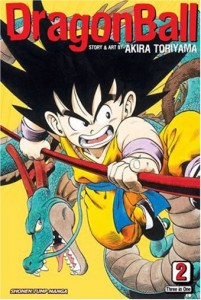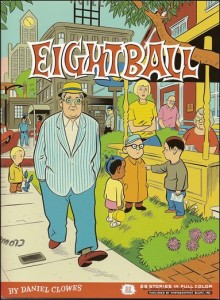 A frequent cause for the contention when it comes to comic books and graphic novels has been the age-old, yet incorrect, idea that all comics are for children. In this light, it is not hard to discern why books featuring even brief glimpses of nudity have been challenged, including Maurice Sendak’s In the Night Kitchen, Daniel Clowes’ Ice Haven, and Akira Toriyama’s Dragon Ball series.
A frequent cause for the contention when it comes to comic books and graphic novels has been the age-old, yet incorrect, idea that all comics are for children. In this light, it is not hard to discern why books featuring even brief glimpses of nudity have been challenged, including Maurice Sendak’s In the Night Kitchen, Daniel Clowes’ Ice Haven, and Akira Toriyama’s Dragon Ball series.
In the Night Kitchen
Released in the early 1970’s, In the Night Kitchen features several nude illustrations of Mickey, the male, child protagonist of Sendak’s book. Some libraries banned the book, while other librarians, seeking a compromise that would prevent controversy and keep the book on the shelves, painted diapers or underwear over Mickey’s genitals.
Sendak’s editor, Ursula Nordstrom, sent a letter to a librarian who had actually burned their library’s copy of In the Night Kitchen:
I am indeed distressed to hear that in the year 1972 you burned a copy of a book. We are truly distressed that you think it is not a book for elementary school children. I assume it is the little boy’s nudity which bothers you. But truly, it does not disturb children! […] I think young children will always react with delight to such a book as In the Night Kitchen, and that they will react creatively and wholesomely. It is only adults who ever feel threatened by Sendak’s work.
In a press release, Nordstrom decried the addition of diapers to cover Mickey’s nudity:
At first the thought of librarians painting diapers or pants on the naked hero of Sendak’s book might seem amusing, merely a harmless eccentricity on the part of a prim few. On reconsideration, however, this behavior should be recognized for what it is: an act of censorship by mutilation rather than by obvious suppression.
Dragon Ball
 Three decades later, nudity caused Toriyama’s Dragon Ball series to come under fire after a parent objected to their nine-year old child checking out a copy of Dragon Ball: The Monkey King. According to WBOC:
Three decades later, nudity caused Toriyama’s Dragon Ball series to come under fire after a parent objected to their nine-year old child checking out a copy of Dragon Ball: The Monkey King. According to WBOC:
There were concerns expressed that the books, which school officials later learned were intended for young adults, depict some violence and show nudity. Because of the concerns, school officials began the process of removing the book from media center shelves for review. “Dragon Ball” series books at Pittsville Elementary and Middle School and Parkside High School were removed from media center shelves for a committee review as required by procedures and policy.
The publisher of Dragon Ball recommends the books for ages 13 and up, revealing that even when a publisher tells a library not to allow a particular book to be borrowed by children, not all libraries, organizations, and parents will pay attention:
The committee recommended that the books in the Dragon Ball series, which were recommended by the publisher for ages 13+, be removed from the entire public school library system, including at the high school level. School officials acknowledged the value of graphic novels in their libraries, and indicated that they would embark on “instituting more focused and ongoing professional development training on the selection of media materials and additional procedures to handle student requests for media books and resources.”
Ice Haven
 While books, libraries, artists, and publishers can expect to be targets of challenges, there are times when other people become embroiled in a challenge. Such is the case with Nate Fisher, a high school teacher in Guilford, Connecticut, who lost his job in 2008 for loaning a student a copy of Dan Clowes’ comic book, Eightball #22 (later published as Ice Haven), which contained nudity.
While books, libraries, artists, and publishers can expect to be targets of challenges, there are times when other people become embroiled in a challenge. Such is the case with Nate Fisher, a high school teacher in Guilford, Connecticut, who lost his job in 2008 for loaning a student a copy of Dan Clowes’ comic book, Eightball #22 (later published as Ice Haven), which contained nudity.
When a transfer student arrived at school without having the opportunity to perform her summer reading assignment, Fisher gave her the option of choosing a book from his classroom library to read over the Labor Day weekend to make up for the missing work. The student chose the Clowes book. Fisher approved the choice, but warned the student that it contained mature content. Clowes’ book contains profanity, course language and brief non-sexual nudity.
The student’s parents objected to the book being assigned and immediately filed complaints with the school and the Guilford police department, which opened a criminal investigation. The parents also went to local media and alleged that the teacher gave their child a pornographic comic, insinuating a potential predatory motive. Fisher was placed on administrative leave and resigned a week later. Ultimately, no criminal charges were brought against Fisher, but he suffered dire consequences at the hands of censors.
Given their visual nature, graphic novels and comic books are among the most-challenged books in libraries and schools. CBLDF is an official sponsor of Banned Books Week, which takes place September 30 – October 6, 2012. Please help support CBLDF’s defense of your right to read by making a donation or becoming a member of the CBLDF!
Mark Bousquet is the Assistant Director of Core Writing at the University of Nevada, Reno, and reviews movies and television programs at Atomic Anxiety.